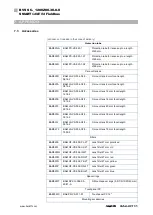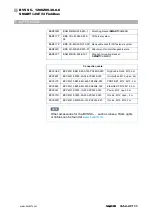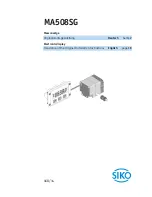
6
STARTUP
53
www. matrix-vision.com
BVS SC-_1280Z00-30-0-0
SMART
CAMERA
Fieldbus
www.balluff.com
NOTE
After the upload of the parameter data, the vendor ID and device
ID of the connected IO-Link device are also still saved until the da-
ta records are deleted.
When the connected IO-Link device is started, a validation takes
place. Thus, only an IO-Link device of the same type can be used
for the data management. If an IO-Link device of a different type is
to be used, the contents of the parameter server must be deleted.
Data storage is supported only by IO-Link devices with IO-Link
Revision 1.1. The upload flag on the IO-Link device is needed to
overwrite already saved data in the parameter server with new pa-
rameter data of the same IO-Link device.
To enable the upload flag of an IO-Link device the data value 5
must be entered in Index 2, Subindex 0.
Fault State
The Fault State function can be used to specify which value the digital in-/outputs as-
sume when the bus connection is lost. This always affects pin 2. It affects pin 4 if it is
configured as a digital I/O line.
Standard services 14 (Get Attribute Single) and 16 (Set Attribute Single) are used for the
fault state. Values can be read (Get Attribute Single) and written (Set Attribute Single).
Attribute 6 enables or disables the Fault State function:
Class
Instance
Attribute
Value
9
1
6
0: Fault State disabled
1: Fault State enabled
When the Fault State function is enabled Attribute 5 is used to specify how the line
should respond in case of a bus interruption. It can either enable the output (Output on)
or hold the last set value (Hold last state).
Class
Instance
Attribute
Value
9
1
5
0: Output on
1: Hold last state
If the
Fault State
function is not enabled, IOs are high-impedance if the bus connection
fails, and behave then like an input.
NOTE
The fault state settings are stored only temporarily in the
SMARTCAMERA
. They are deleted after a restart.
To ensure a long-term fault state configuration, the configuration
has to be programmed via the host system so that the settings are
transferred to the module again whenever the system is restarted.
6.7.8 Configuration via
explicit messages















































